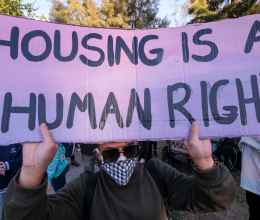Two years ago, New Jersey felt shockwaves from the brutal murder of George Floyd and responded with horror, as well as an outpouring of unity toward the goal of ending pervasive racial inequality by confronting violent, racially discriminatory policing.
Only a few weeks shy of that somber anniversary, an avowed white supremacist allegedly opened fire on Black shoppers in a Buffalo supermarket, leaving 10 people dead, three others seriously injured, and families and communities bereft of their loved ones.
The May 14 slaughter in Buffalo, explicitly rooted in racial hatred, reminds us of the daily, deadly consequences of failing to address racial inequities when transformative moments arise.
The movement following George Floyd’s murder suggested the great potential for confronting discrimination and police violence in communities of color, with communities pooling together the one resource most capable of creating change: political will.
Indeed, virulent strains of racism exist in New Jersey, with the Office of the Attorney General reporting a record number of bias incidents in 2021. Unsurprisingly, 2022 has also been filled with shockingly racist incidents. Last month, audio of the mayor of Clark saying the n-word and other slurs surfaced amid media reports that Clark Township paid $400,000 to keep those recordings out of the public eye.
In February, officers intervening in a fight between two teenagers at the Bridgewater Commons mall tackled and handcuffed the Black teenager and allowed the lighter-skinned teenager to watch from a nearby couch, a police action that the teen himself described as “plain old racist.”
New Jersey courts have recently made progress in restraining police power, including limiting pretextual stops and allowing the public release of some internal affairs records. These rulings demonstrate just how much further lawmakers can go to implement a broad legislative vision, rather than piecemeal strides forward through litigation. While we clearly believe in the power of the courts, legislators are elected by the people to legislate. They must now rise to meet the demands of this fraught time and this painful anniversary instead of standing silently by.
Decisive action is more essential now than ever. Our lawmakers have an imperative to lead with their diverse constituencies in mind and take immediate action to confront the racial injustices surrounding us. Three key legislative priorities are fundamental to begin the hard work of changing a brutal, deeply unjust criminal legal system.
Identifying police officers with histories of violent or racist policing is a key part of making our criminal legal system more just, but New Jersey is among the minority of states that keep police disciplinary records hidden from the public. It is essential that we change this by passing S371/A996, which would make this information available through the Open Public Records Act.
We must pass legislation to enable community members to investigate police misconduct and hold police officers accountable through civilian complaint review boards, or CCRBs. However, for CCRBs to truly serve as a check on police rather than become accountability theater, these boards must have subpoena power, authority to investigate concurrently with internal affairs, and legitimate power to recommend discipline. It is past time for communities — who also want to be safe from crime and harm — to have a meaningful voice in upholding standards around how their own communities are policed.
Lastly, we need to follow the lead of states like Colorado and New Mexico and pass legislation ending qualified immunity for police officers. This outdated legal doctrine makes it nearly impossible for people to obtain financial damages against the government for violations of an individual’s civil rights — including use of excessive force — if the officer’s actions fall under a broad category of sufficiently similar conduct or “clearly established” law, an idea that sidesteps the real question: whether a reasonable officer should have known that his behavior was unlawful. Unless the Legislature acts, qualified immunity will continue to be an unalloyed failure of policy, law, and morality that allows police officers to skirt accountability for harmful and unlawful acts.
Even as police budgets rise and data reveal year-by-year declines in overall crime, down to a third of the crime rates of the early 1990s, over-policing of communities of color continues unabated. We know from arrest data, and from New Jersey’s status as having the worst-in-the-nation Black-white disparity in its prisons, that these aggressive tactics fall most harshly on people of color. The consequences are deadly: while Black Americans account for less than 13% of the U.S. population, they are killed by police at over twice the rate of white Americans.
To take up the duty to hold police accountable and protect constituents’ lives, our elected leaders must be bold in dressing the wounds that have barely been tended to, much less healed. Unjust actions must be met with reactions centered on justice, and we must demonstrate our refusal to bow to white supremacy in whatever form it takes – whether through the gun of an 18-year-old emboldened by racist rhetoric or the knee of a police officer.
This piece was originally published by The Star-Ledger/NJ.com





